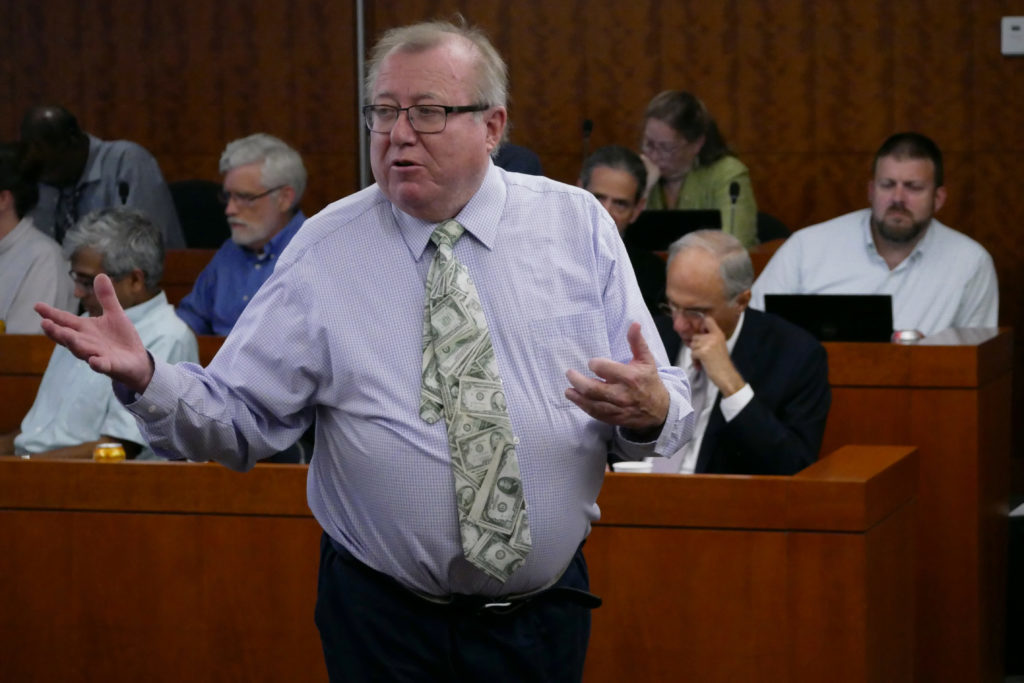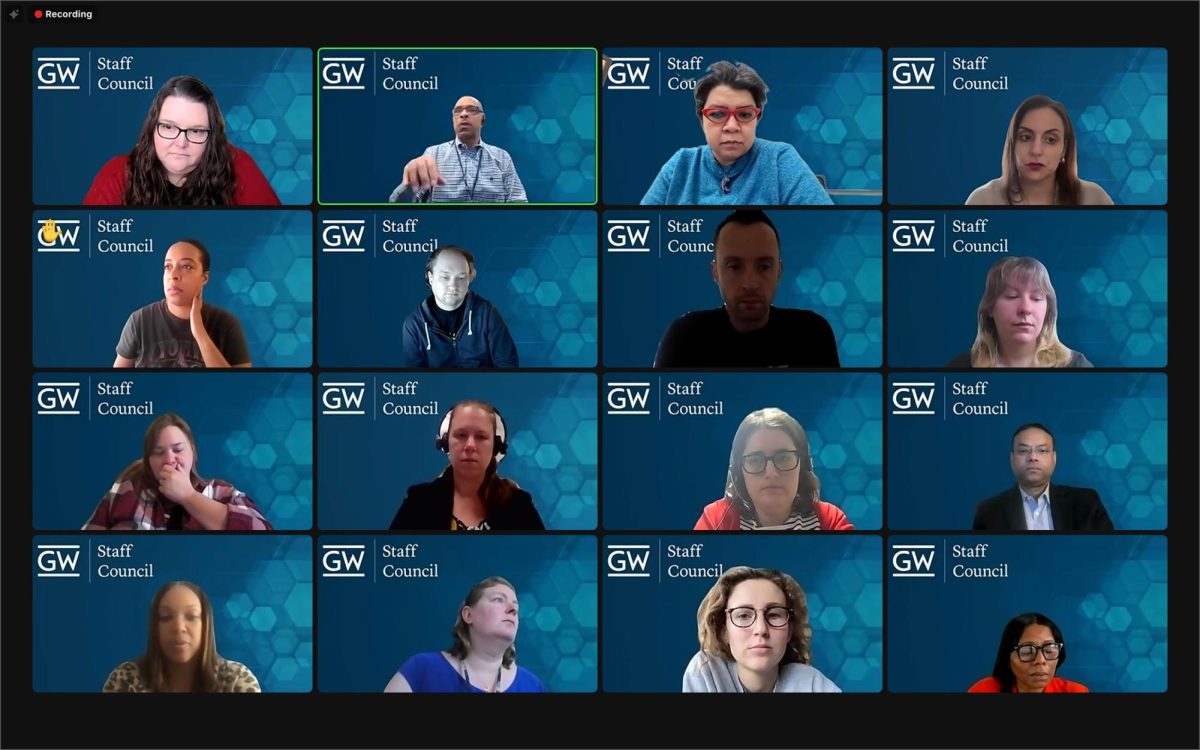Updated: April 19, 2021 at 2:32 p.m.
Faculty said current financial planning for fiscal year 2022 doesn’t allocate enough funds for research.
Officials said as the deans for all of GW’s schools and vice presidents submitted funding requests to build a budget for FY 2022, administrators found that they could not fulfill all of these requests while also meeting other financial goals. But faculty said officials should prioritize funding for research in light of delays during the COVID-19 pandemic.
Chief Financial Officer Mark Diaz said officials asked the deans and vice presidents to justify their requests rather than receive money based on how much they have been allocated in the past, as they typically do in non-pandemic years. Diaz said the deans and vice presidents’ requests exceeded the money that the University could afford to give them by $50 million.
“This is nothing about reducing the current spending, what this is is it was a number of requests that exceeded what would be consistent with where we needed to land for the budget, therefore, how do we get it down,” he said.
Joseph Cordes, the chair of the Faculty Senate’s fiscal planning and budget committee and a professor of economics, said at the April senate meeting that officials are looking to reduce unit- and school-based requests by $50 million to close a projected deficit of $10 million, allocate $15 million for contingencies and use $25 million for a surplus.
He said nonprofit organizations like GW often run a surplus, so they can invest in the future of the organization, which GW has done in the past. Cordes said allocating more money to a surplus can also boost GW’s bond rating – the assessment given by credit rating agencies that identify the quality of an organization’s credit.
Standard and Poor’s Global Ratings and Moody’s Investors Services have rated GW as A+ and A1, respectively, during the pandemic. The ratings came at a time when Moody’s downgraded higher education as an industry from “stable” to “negative.”
“A better bond rating means that when we need to borrow money we don’t have, we’re able to do it on reasonably good terms,” Cordes said.
But Cordes said faculty, administrators and the Board of Trustees should have conversations about the necessary size of the surplus. He said the gap in the current FY 2022 budget proposal indicates that officials have made a conscious decision to allocate money to a surplus instead of using the funds for other purposes, like research.
“A number of the faculty feel that maybe there hasn’t been as much discussion of that,” he said. “It’s just taken as a given that the Board would like the surplus to be this much, and therefore we ought to go ahead and undertake the measures that we need to get there.”
Diaz, the chief financial officer, said setting money aside for a margin or surplus can help officials reinvest money in the University and its infrastructure to support GW’s long-term well-being. He said if officials don’t set aside a surplus, they could end up with a “significant deferred maintenance backlog” that can delay renovations to campus buildings and affect other parts of student life.
Officials suspended most hiring processes and capital projects last March at the beginning of their efforts to mitigate the financial impact of the pandemic.
“You need margins to reinvest back into your enterprise – you need margins to make strategic investments,” Diaz said. “Otherwise, what you’re doing is to just kind of figure out how you stay within a box and save a little over a year and then you can make your investment once you save enough.”
Harald Griesshammer, a faculty senator and an associate professor of physics, said officials should tap into the endowment to provide more money for faculty research or redirect the part of the budget proposal allocated for reserves to cover additional research expenses for the upcoming fiscal year.
Grace Speights, the chair of the Board, vowed last May not to tap into GW’s endowment for officials’ pandemic budget mitigation efforts to protect the University’s long-term financial standing.
“There are different arguments whether or not a university in general or a nonprofit organization in general should have a surplus,” Griesshammer said. “I don’t care about this argument. I care about the question ‘Is this the time to produce surplus?’ And I say it’s not. This is actually the time to invest, to have a deficit, because we need to ramp up operations.”
Griesshammer said with GW working through a “budget crisis” as the pandemic progresses, officials should allocate more money for research in FY 2022 than they have in pre-pandemic years because faculty will need more funding to conduct research and field work during the upcoming fiscal year to make up for the opportunities they missed due to the pandemic.
“There are too many people in the administration and on the Board who do not understand that this is not normal times, and you can’t do things in the wrong way,” he said.
GW distributed more money on research expenditures during 2020 than any other calendar year in the University’s history.
The University faces a $180 million budget shortfall during FY 2021 due to the pandemic, which officials have sought to address through measures like layoffs and the suspension of base and matching retirement contributions.
“We are coming out of a complete shutdown of the University – we need to actually invest right now, we need to rehire people, we need to go out on conferences, we need to pick up research,” Griesshammer said. “Our students need to have new opportunities to travel internationally. We should actually have a much bigger budget than in 2019 because there are going to be expenses that we never had been thinking about in 2019.”
Guillermo Orti, a faculty senator and professor of biology, said the proposed FY 2022 budget does not accommodate for tenure-track faculty who need to conduct extra research or fieldwork this upcoming year, since they need to make up for lost opportunities during the pandemic to achieve tenure.
“There are other impacts that are less visible but are very concerning as well, especially tenure-track faculty who need to show productivity in order to earn tenure,” he said. “How are these folks going to be able to do that when they have their hands tied and they don’t have access to resources?”
Orti said the lack of investment in research could also negatively impact GW’s Higher Education Research and Development rankings. The University’s HERD rankings have already dropped from 80 to 86 from FY 2018 to FY 2019, which could negatively affect reputation, he said.
“So we’ve been slipping down and this is only going to exacerbate this trend, and we’re going to be losing footing in our international rankings and prestige and reputation for the University if we don’t invest,” he said. “So rather than put the money into the savings account, this is a time to invest and try to get us out of the hole.”
This post has been updated to clarify the following:
This story has been updated to clarify a paraphrase from Diaz. A previous version of this post said officials froze all hiring processes at the start of the pandemic. Only most processes were paused.







